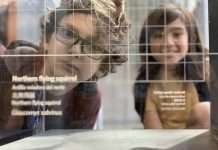 The eyes are the vessel through which your child sees the world. It’s important to start teaching your child how to take care of their eyes from a young age, so that as they grow older they will not only maintain clearer vision but also be free from other vision-related problems. Here are a few simple steps to maintain your child’s eye health, and prevent vision problems.
The eyes are the vessel through which your child sees the world. It’s important to start teaching your child how to take care of their eyes from a young age, so that as they grow older they will not only maintain clearer vision but also be free from other vision-related problems. Here are a few simple steps to maintain your child’s eye health, and prevent vision problems.
1. Schedule Frequent Eye Exams
Between the ages of 5-18, your child’s vision can change quickly. Make sure to frequently visit your optometrist to take eye exams, so you’ll know sooner rather than later if your child’s prescription is changing. It’s always much better to know sooner, so you can update your child’s prescription lenses. If you don’t replace your child’s lenses, then they will be straining their eyes to be able to see, which will weaken their vision even more. You can check the link for prescription lenses replacement.
Besides change in prescription, your optometrist will also be able to detect signs of disease, before your child has any symptoms. This way there will be a much lower risk of permanent vision loss because you’ll be getting treatment for the disease earlier.
2. Maintain a Healthy Diet
Your child should already be eating as healthy a diet as possible. During their years of growth, it is vital to their health to be eating all the nutrients necessary. For eye health, it’s important to include lots of fruit, citruses, yellow and green leafy vegetables, fish, and eggs in their diet.
It has been shown that nutrients such as vitamins A, C, E, zinc, lutein, and omega-3 fatty acids fight against sight-threatening diseases such as cataracts and macular degeneration.
It’s also important to make sure your child always stays hydrated and drinks plenty of water. Staying hydrated is not only vital for overall health but also plays a key role in maintaining healthy eyes.
3. Less Time on Technology
It seems like technology has taken over our lives. It’s almost impossible to go a day without being in contact with some form of technology. Especially kids, who spend hours at school on computers or staring at a board, who then come home to do homework on computers and later on watch TV or play computer games. Staring at screens for too long makes your eyes strain, which causes vision to weaken.
It’s important to introduce new forms of entertainment to your children, so they do not spend hours and hours on technology. Spending an hour or two playing outside with your children, or taking them to the museum, theater or park will show them everything the world has to offer outside of technology. This way, their time with technology will hopefully lessen, as their interest in the world grows.
But even when your child does spend time on a device, teach them the 20-20-20 rule. After 20 minutes of being on a device, they need to take 20 seconds to stare at something 20 ft away. This rule helps reduce eye strain while using technology.
4. Eye Protection
On sunny days, make sure that your child wears sunglasses every time they go outside. Sunglasses help to protect your eyes from the sun’s UV rays. If your child is exposed to too much UV, they have a higher chance of developing cataracts and macular degeneration. Make sure your child’s sunglasses have 99-100% UVA and UVB protection.
Besides protecting your eyes from the sun, you need to protect your child’s eyes during everyday activities such as sports, yard work, experiments, etc. They should always be wearing safety goggles when playing sports, and wearing a helmet when riding a bike. If your child doesn’t wear a helmet, they are at risk of getting a concussion, which can cause lingering eye problems. There are also some tools that may help protect eyes from screentime, such as blue light blockers.
5. Add Protective Coatings and Treatments to Lenses
You can add many protective coatings and treatments to your child’s lenses, such as blue light, UV protective, anti-glare, anti-fatigue, and light responsive. These coatings are especially important if your child spends a lot of time in front of the computer because they keep the distance between you and the computer in focus, taking off a lot of the strain there is on the eyes to keep things in focus. It would be best to talk to your child’s optometrist, to see which coatings and treatments would work best for your child’s needs.
It’s always important to teach your child the importance of keeping their eyes healthy and to teach your child how to take care of themselves. It’s better to start at a younger age, so they’ll have a better and deeper understanding of what they should and shouldn’t do, to maintain their eye health and prevent future vision problems.
















